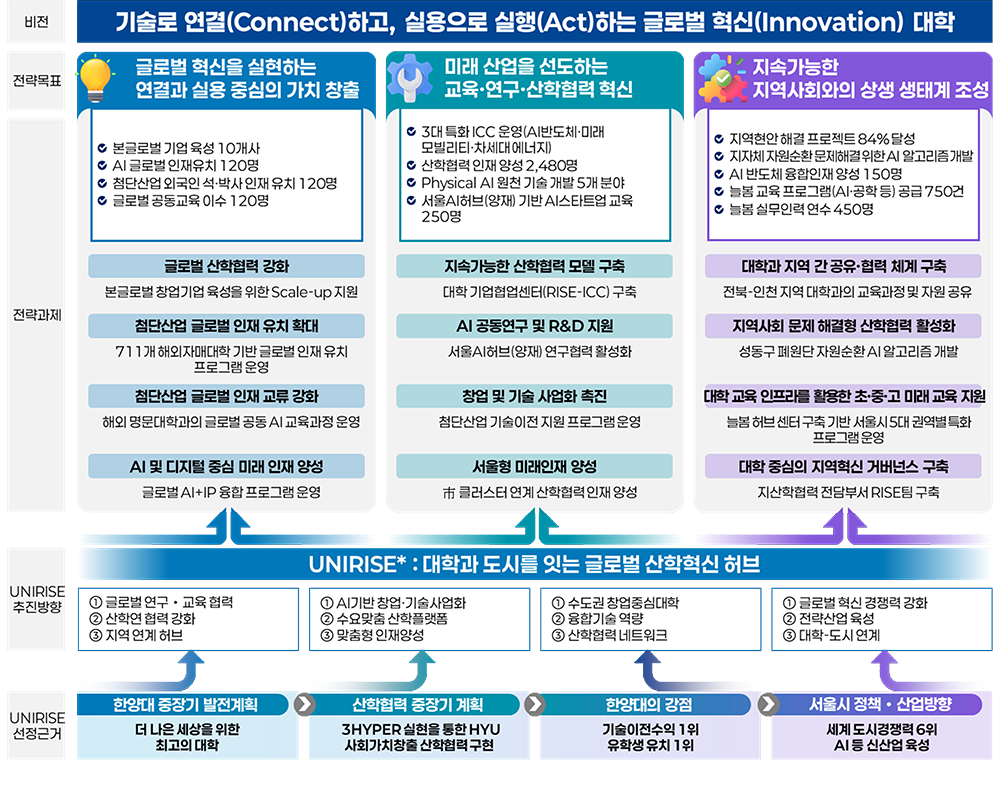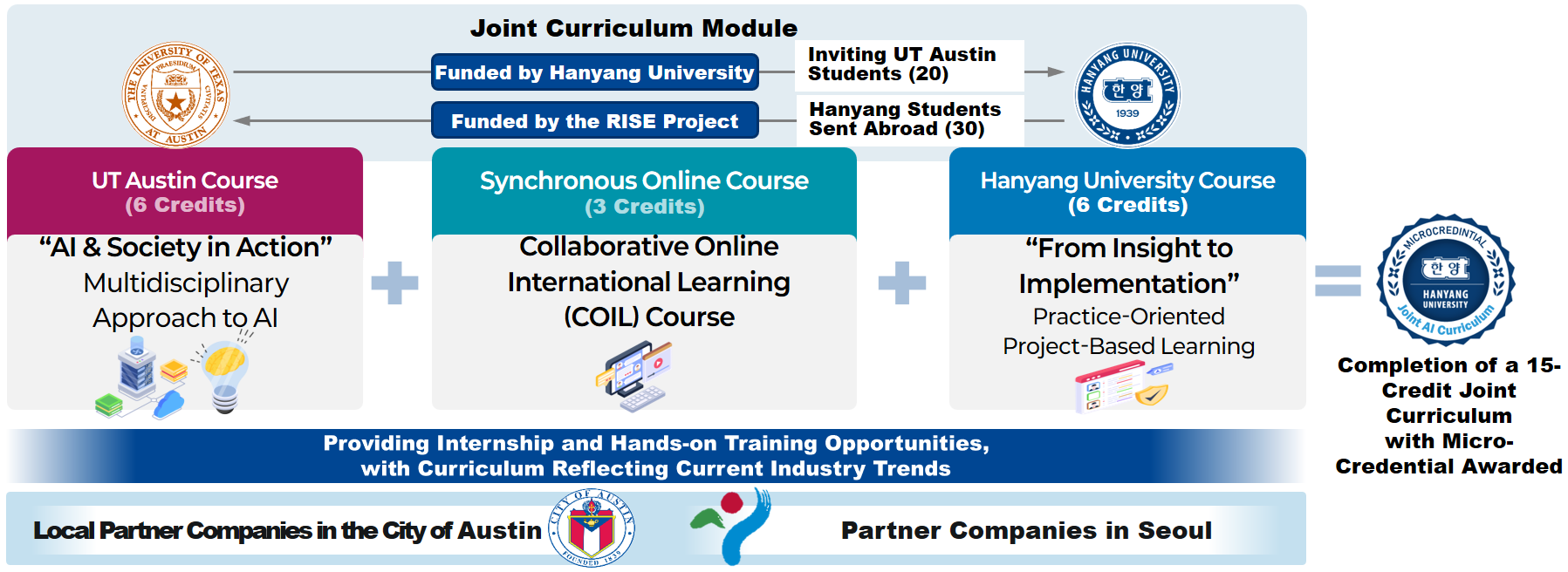Hanyang RISE - Hanyang University Institute for RISE
Vision and Goals
Hanyang RISE, Powering Seoul’s Future Through Practical Innovation
■ Vision : A global innovation university that connects through technology and drives change through practical action
■ Goals : Achieve global innovation, lead future industries, and build a regional co-growth ecosystem based on the creation of practical value
- (Global) Drive global innovation by creating value through connection and practical solutions
- (Leading Future Industries) Revolutionize education, research, and industry-academia collaboration to spearhead future advanced industries
- (Co-Growth) Foster a sustainable, co-growing ecosystem with local communities
Hanyang RISE builds on 11 years of LINC achievements, expanding industry-academia collaboration into entrepreneurship, technology commercialization, and regional engagement. It aims to return the university’s capabilities to Seoul and its community, advancing as a global innovation university through AI research, global talent development, education innovation, and local problem-solving.

Selection of Hanyang RISE Unit Projects and Linkage to the Seoul RISE Project
- Selection Basis
Based on the Seoul RISE Master Plan and Hanyang University’s mid- to long-term development strategy, three strategic goals and twelve initiatives were identified by organically connecting the university’s global, education, research, startup, and industry-academia collaboration strengths. Through stakeholder consultations with internal and external members, local governments, and industries, eight CAI (Connect-Act-Innovation) based Seoul RISE unit projects were selected to drive tangible outcomes. - Hanyang’s Strength
A sustainable innovation platform unique to Hanyang University, differentiated from other universities in Seoul.
Project Implementation Structure
■ Dedicated Organization
Under the direct supervision of the Director, Hanyang University Institute for RISE and the RISE Team (established in September 2024) oversee the overall RISE Project. A system comprising the RISE Team, three Hub Centers, and eight offices has been established to strengthen each RISE Project.
■ Decision-Making Structure
To independently or collaboratively operate Hanyang RISE unit projects and to enable swift decision-making and strong partnerships with overseas universities and institutions, three committees and three subcommittees have been established.
Project Implementation Plan
| 프로젝트 | 단위과제별 주요내용 |
|---|---|
| 1. 글로벌 대학 경쟁력 강화 |
① 글로벌 산학협력 선도 ■ (사업목표) 국가전략기술(에너지, 배터리, 반도체 등)·서울 특화산업 기술(AI, 바이오 등) 글로벌 핵심 IP 확보, 본글로벌 창업기업 10개사 성과 창출  ■ (추가투자) 해외 창업거점센터 설치 운영, 해외 VC 펀드 합작으로 본글로벌 기업 집중 육성* 中 산동대 한중청년창업센터(신규), 美 실리콘밸리·시애틀 외 거점센터 운영 |
|
② 첨단·미래산업 외국인 인재 유치 |
|
| ③ 미래인재 글로벌 역량 강화 ■ (사업목표) 美 텍사스오스틴대(AI, 데이터사이언스)와 글로벌 AI 공동교육과정 운영·120명 이수, 해외대학·현지기업(우버, 엔비디아 등) 인턴십 운영  ■ (추가투자) 한양대학교 국제재단(LA소재) 미주지역 교환학생·유학생 장학금 지원, 해외 대학 학생 초청·국내 학생과 글로벌 AI 교류 프로그램 신설 등 우수인재 유치 |
|
| 2. 서울 전략산업 기반강화 |
④ 산학협력 생태계 활성화 ■ (사업목표) 산업수요 맞춤형 실무 인재 양성(반도체, AI, 바이오 등), 서울 전략산업 특화 3대 RISE-ICC(기업협업센터, 차세대에너지·AI반도체·미래모빌리티) 설립을 통한 지역 산학협력 선도  ■ (추가투자) 특성화연구원 신설(AI, 국방, 양자)을 통한 대학-지역특화산업 육성 |
| ⑤ AI·바이오 클러스터 혁신생태계 확산(AI분야) ■ (사업목표) 대학별 특화(Physical AI) 분야 육성, 서울AI허브(양재)와 연계한 AI 인프라 구축, AI 스타트업 기업 육성 등을 통한 서울 AI 클러스터 혁신생태계 확산  |
|
| 3.지역사회 동반성장 |
⑥ 지역 현안 문제 해결 ■ (사업목표) 자치구(성동구, 동대문구 등) 패션·봉제산업 상권활성화를 위해 봉제 폐기물 다량 배출 문제 해결형 프로젝트 운영, AI·데이터 분석기술 적용한 봉제원단 배출, 수거 및 재활용 솔루션 제시
|
| ⑦ 서울-지방 공유·협력 활성화 ■ (사업목표) 서울(한양대)-지방(인하대, 전북대) 교육·연구 교류를 통해 반도체 3대 특화분야 기반 공동 교육과정 운영으로 150명 이수자 배출, 반도체 산업 생태계 조성  ■ (참여기업) 테라다인코리아(미국), 아드반테스트코리아(일본), 오디텍(한국) 반도체 전문기업과 산학프로젝트 운영 |
|
| ⑧ 서울 미래키움 교육지원 생태계 구축 ■ (사업목표) 서울의 지역적 특성과 교육수요를 반영한 서울특화 늘봄학교 프로그램 개발·운영, 틈새없는 배움, 모두를 위한 성장 ‘서울형 늘봄with U’)  |
|
| 4. 대학창업 육성 | ⑨ 서울 캠퍼스타운 ■ 2025년 하반기 별도 공모를 통해 2026년부터 2년간 사업 수행하는 대학 선정 ■ 선정규모: 20개소(26.1~28.2, 2년간 수행 / 연 15억 이내 지원 ■ 주요내용: ▲교내 창업 중심, RISE 연계 청년 창업 육성체계 확립(25년~29년 연 1000팀 청년 예비·초기 기업 육성, 초기 기업 맞춤형 대학별 지원 프로그램 운영, 캠퍼스타운 기업성장센터 프로그램 집중 지원, 시 창업생태계 연계하여 스케일업 후속 지원) ▲대학창업 교육 확대(창업 인재 학위과정 개설 운영, 창업문화 확산 교육 프로그램 추진) |
Expected Outcomes
■ University Development. Strengthen the university’s research and startup ecosystem and enhance global competitiveness by advancing industry-academia infrastructure, expanding global joint research, and maximizing outcomes in advanced technology research.
■ Regional Development. Build a foundation for sustainable regional growth by advancing local industries, creating youth employment, solving regional issues, and promoting Seoul-regional collaboration.
Vision and Goals
Hanyang RISE, Powering Seoul’s Future Through Practical Innovation
■ Vision : A global innovation university that connects through technology and drives change through practical action
■ Goals : Achieve global innovation, lead future industries, and build a regional co-growth ecosystem based on the creation of practical value
- (Global) Drive global innovation by creating value through connection and practical solutions
- (Leading Future Industries) Revolutionize education, research, and industry-academia collaboration to spearhead future advanced industries
- (Co-Growth) Foster a sustainable, co-growing ecosystem with local communities
Hanyang RISE builds on 11 years of LINC achievements, expanding industry-academia collaboration into entrepreneurship, technology commercialization, and regional engagement. It aims to return the university’s capabilities to Seoul and its community, advancing as a global innovation university through AI research, global talent development, education innovation, and local problem-solving.

Selection of Hanyang RISE Unit Projects and Linkage to the Seoul RISE Project
■ Selection Basis
Based on the Seoul RISE Master Plan and Hanyang University’s mid- to long-term development strategy, three strategic goals and twelve initiatives were identified by organically connecting the university’s global, education, research, startup, and industry-academia collaboration strengths. Through stakeholder consultations with internal and external members, local governments, and industries, eight CAI (Connect-Act-Innovation) based Seoul RISE unit projects were selected to drive tangible outcomes.
■ Hanyang’s Strength
A sustainable innovation platform unique to Hanyang University, differentiated from other universities in Seoul.
 [Hanyang’s Performance in Seoul] |
 |
Project Implementation Structure
■ Dedicated Organization
Under the direct supervision of the Director, Hanyang University Institute for RISE and the RISE Team (established in September 2024) oversee the overall RISE Project. A system comprising the RISE Team, three Hub Centers, and eight offices has been established to strengthen each RISE Project.
■ Decision-Making Structure
To independently or collaboratively operate Hanyang RISE unit projects and to enable swift decision-making and strong partnerships with overseas universities and institutions, three committees and three subcommittees have been established.
Project Implementation Plan
■ Project 1. Strengthening Global Competitiveness of Universities
① Leading Global Industry-Academia Collaboration
- Project Goal. Secure global core IP in national strategic technologies (energy, battery, semiconductor) and Seoul’s specialized industries (AI, bio), and generate outcomes with 10 born global startups.
- Additional Investment. Establish and operate overseas startup hubs and foster born global companies through joint overseas VC funds.

② Attracting Global Talent for Advanced and Future Industries
- Project Goal. Recruit 120 international master’s and doctoral students and establish the HY All-Care System to provide full-cycle support from admission to employment and settlement (utilizing 711 partner universities across 70 countries).
- Additional Investment. Completion of two new dormitory buildings for international students (603 rooms, accommodating 1,198 students) by April 1, 2025.

③ Enhancing Global Competencies of Future Talent
- Project Goal. Operate a global AI joint education program with the University of Texas at Austin (AI, Data Science) for 120 students, and provide internships with overseas universities and local companies (e.g., Uber, NVIDIA).
- Additional Investment. Support scholarships for exchange and international students through the Hanyang University International Foundation (based in LA) and launch new global AI exchange programs between international and domestic students to attract top talent.

■ Project 2. Enhancing the Foundation of Seoul’s Strategic Industries
④ Strengthening the Industry-Academia Collaboration Ecosystem
- Project Goal. Develop industry-demand-driven practical talents (in fields such as semiconductors, AI, and bio) and lead regional industry-academia collaboration by establishing three specialized RISE-ICCs (Corporate Collaboration Centers for Next-Generation Energy, AI Semiconductors, and Future Mobility) aligned with Seoul’s strategic industries.
- Additional Investment. Establish new specialized research institutes (AI, Defense, Quantum) to foster collaboration between the university and regional industries.

⑤ Expanding the Innovation Ecosystem for AI and Bio Clusters
- Project Goal. Foster specialized fields such as Physical AI at each university, build AI infrastructure in connection with the Seoul AI Hub (Yangjae), and expand the AI innovation ecosystem by supporting AI startups.
- Partner Institutions. 126 institutions such as Hyundai Motor Group’s ZER01NE
■ Project 3. Promoting Co-Growth with the Local Community
⑥ Solving Regional Issues
- Project Goal. Operate solution-driven projects to address excessive textile waste issues in local fashion and sewing industries (e.g., Seongdong-gu, Dongdaemun-gu), applying AI and data analytics to optimize fabric waste discharge, collection, and recycling processes.
- Upcycle Seoul. Promote fabric recycling projects and develop an AI-based job matching platform to support talent development and career management in Seoul’s sewing industry.
⑦ Promoting Seoul-Regional Sharing and Cooperation
- Project Goal. Foster 150 graduates by operating joint semiconductor curricula across three specialized fields through education and research exchanges between Seoul (Hanyang University) and regional universities (Inha University, Chonbuk National University), contributing to the development of the semiconductor industry ecosystem.
- Partner Companies. Collaborate with leading semiconductor companies — Teradyne Korea (USA), Advantest Korea (Japan), and Auditech (Korea) — through industry-academia projects.

⑧ Building the Seoul Future Talent Education Ecosystem
- Project Goal. Develop and operate Seoul-specific Neulbom School programs tailored to the city's regional characteristics and educational needs, promoting continuous learning and inclusive growth under the vision of "Seoul Neulbom with U.“
- Key Details. A consortium of five universities — Ewha Womans University (lead), Kookmin University, Seoul National University, Sookmyung Women’s University, and Hanyang University — has been formed. Hanyang University plans to leverage its strengths in engineering and technology to offer practice-oriented, creative-convergence Neulbom education programs. Focusing on the School of Computer Science and Engineering, Hanyang will develop science and technology curricula centered on AI, robotics, and coding, and collaborate with departments such as Educational Technology and Applied Art Education to design and operate Neulbom programs across diverse areas, including creativity and science, culture and arts, humanities and social sciences, and emotional development.
■ Project 4. Fostering University-Based Startups
⑨ Seoul Campus Town Development
- Call for Proposals Plan. Select universities through a separate call in the second half of 2025 to operate projects for two years starting from 2026.
- Selection Scale. 20 universities (project period: Jan 2026~Feb 2028; annual funding up to KRW 1.5 billion)
- Key Details. ▲ Establish youth entrepreneurship support systems centered on campus startups and linked to RISE (nurture 1,000 youth startup teams annually from 2025 to 2029, operate customized startup support programs by university, intensively support Campus Town Growth Centers, and provide follow-up scale-up support linked to the city's startup ecosystem), ▲ Expand entrepreneurship education (establish degree programs for startup talent and promote entrepreneurship culture programs)
Expected Outcomes
- University Development. Strengthen the university’s research and startup ecosystem and enhance global competitiveness by advancing industry-academia infrastructure, expanding global joint research, and maximizing outcomes in advanced technology research.
- Regional Development. Build a foundation for sustainable regional growth by advancing local industries, creating youth employment, solving regional issues, and promoting Seoul-regional collaboration.

